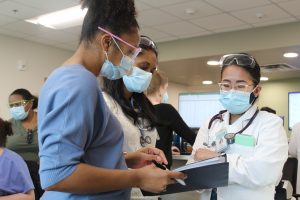March is Kidney Awareness Month–a time to highlight a disease that affects more than 30 million Americans. It’s important to know the risk factors of chronic kidney disease, such as diabetes, high blood pressure, heart disease and family history. Kidney disease can be caused by glomerular diseases and autoimmune disease, or it can be genetic. Testing is important because there are usually no early symptoms. While there is often no cure, kidney disease can be treated, and many cases are preventable. Learn how specialists with the UNC Kidney Center and Division of Nephrology and Hypertension are working to reduce the incidence and burden of kidney disease.
Kidney Care—Breaking Down Barriers to Achieve Kidney Health

One in seven North Carolinians has kidney disease, and one-third of adults in the US are at risk for kidney disease. The division’s “Breaking Down Barriers” initiative seeks to accomplish equity within kidney transplantation by directly addressing issues of bias, structural racism, ageism, and gender discrimination while also reducing inefficiencies in the evaluation process. Programs seeking to address psychosocial barriers to kidney transplantation have also been created. The eGFR modifier for African-Americans has been eliminated as a determinant of transplant candidacy, thereby removing the disadvantage for African-Americans in referral timing. UNC transplant specialty clinics include a Latinx clinic where Spanish is the primary language, a frailty clinic for assessment of candidates over age 70, a high BMI clinic for those with BMI >40 kg/m2 who are attempting to lose weight to achieve transplant candidacy, and a pediatric transplant program. In 2020, the UNC transplant team performed a record 157 kidney transplants, a >20% increase over the preceding year. Through collaborative efforts of surgical and transplant colleagues at UNC, innovative care pathways have been developed to improve access to transplantation, increase the use of home dialysis modalities, and to provide timely placement of access for dialysis.

The Glomerular Disease and Vasculitis Program—Strengthening Multidisciplinary Care
The glomerular disease and vasculitis program at UNC provides state-of-the-art expertise in the diagnosis, management, and treatment of patients with glomerular disease and vasculitis. The glomerulonephritis (GN) and vasculitis team, led by Dr. Ronald Falk, chair, department of medicine, is internationally renowned for its clinical and scientific expertise. The opening of the Eastowne facility enables the coordination of multispecialty collaborative care with colleagues from pulmonary medicine, rheumatology, and dermatology. Research efforts are fully integrated into clinical care. The Glomerular Disease Collaborative Network, established at UNC in 1985, has bolstered the understanding of the pathogenesis and treatment of GN and vasculitis. The UNC Kidney Center Clinical Trials unit affords the opportunity for individuals to participate in the study of novel treatments. Finally, the Division offers advanced training in GN. The program has trained 17 fellows over 30 years, nine of whom are faculty members in the Division.
For more information about our research at the UNC Kidney Center, please see the following links:
UNC Kidney Center Labs
UNC Glomerular Disease Collaborative Network Research Registry
UNC Kidney Center Clinical Trials

Excellence in Hypertension Care—The UNC Hypertension Clinic
Despite the advancement of hypertension treatment options over the past 50 years, fewer than 50 percent of Americans with hypertension have their blood pressure under control. Uncontrolled hypertension significantly increases the risk of cardiovascular and kidney disease. The mission of the UNC Hypertension Clinic is to reduce the morbidity and mortality of hypertension through the provision of expert and multidisciplinary care. The multidisciplinary care team includes Dr. Raven Voora and Dr. Romulo Colindres from the division of nephrology and hypertension, and Dr. Alan Hinderliter from the division of cardiology. Zack Deyo, PharmD, clinical manager, ambulatory care clinical services, provides counseling and medication management. Dr. Leslie Davis, a PhD nurse practitioner, offers lifestyle modification counselling. In 2020, the UNC Hypertension Clinic was awarded the American Heart Association’s Comprehensive Hypertension Center Certification to recognize the practice’s commitment to proven, research-based treatment guidelines to care for people with complex or difficult-to-treat hypertension.
Expertise in Kidney Stones—The Multidisciplinary Kidney Stone Program

UNC has a multi-disciplinary Kidney Stone Clinic providing individualized care from dedicated clinicians from the Department of Urology, Division of Nephrology, and Nutritional Services. The clinic, led by Dr. Cynthia Denu-Ciocca, professor of medicine, and Dr. Davis Viprakasit, associate professor of urology, is designed to improve kidney stone treatment and prevention. “One-stop” evaluations are conducted by three specialties from the time of initial diagnosis to the completion of a treatment plan. Using targeted dietary and medication recommendations, patients are monitored using a personalized comprehensive strategy to minimize stone recurrence.
Clinical Care at the Nexus of Women’s Health, Kidney Disease, and Hypertension
Dr. Monica Reynolds, assistant professor of medicine in the division of nephrology and hypertension, in collaboration with Dr. Christina Herrera, assistant professor in the division of maternal-fetal medicine, established the multidisciplinary combined maternal-fetal medicine and nephrology clinic in 2019. Their mission is to improve maternal and fetal outcomes for women with chronic kidney disease (CKD) and pregnancy-related hypertension while also preserving kidney function and reducing long-term cardiovascular risk. The clinic offers preconception counseling as well as pregnancy and postpartum care.
Pediatric Nephrology — Providing Excellence to our Youngest Patients

Under the guidance of Dr. Keisha Gibson, Chief, Pediatric Nephrology, the pediatric nephrology group has grown to five full time faculty members. The group is committed to providing innovative patient-centered, evidence-based care to children with kidney conditions and hypertension from all over North Carolina. Dr. Keisha Gibson, associate professor of medicine and pediatrics, and Dr. Dorey Glenn, assistant professor of medicine, provide expertise in the care of children with glomerular syndromes. Dr. Keia Sanderson, assistant professor in the division, studies the long-term effects of prematurity and neonatal AKI on kidney health. Dr. Westreich, assistant professor of medicine, is a clinician educator who has a passion for healthcare quality and safety. Dr. Stahl, trained in both pediatric nephrology and psychiatry, has clinical and research interests that span the spectrum of chronic kidney disease and mental health. Outpatient care is delivered at the Eastowne location in Chapel Hill as well as in Sanford.